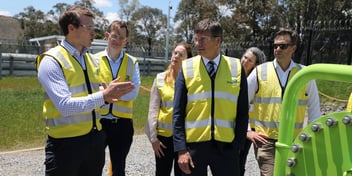Adding biomethane to Sydney's gas network
Sydney Water and Jemena are teaming up to deliver Australia’s first biomethane-to-gas project, which will provide thousands of Sydney homes with renewable, green gas for cooking, heating and hot water.
In partnership with Sydney Water, energy provider Jemena will construct a biogas upgrader facility at the existing Sydney Water Malabar Waste Water Treatment Plant. The facility will upgrade raw biogas and convert it to biomethane, which will then be exported into Jemena’s NSW gas distribution network.
Bioenergy is derived from plant and animal by-products, agriculture, farming, forestry and human wastes. When converted into biomethane, it is a reliable, carbon neutral energy.
The upgrader facility will process raw biogas by removing non-methane gases, until the resulting gas stream meets the Australian Standard gas specification. It will then be injected into the existing gas network.
The Malabar Waste Water Treatment Plant is one of several Sydney Water anaerobic digestion (AD) plants. The bulk of the current AD biogas output is used for electrical power generation and water heating. The biogas that cannot be used via site processes is currently combusted through waste gas burners.
The $14 million project is jointly funded by Jemena, which is contributing $8.1 million, and the Australian Renewable Energy Agency, which will provide up to $5.9 million in grant funding.
The project is expected to have significant environmental benefits, removing 5000 tonnes of carbon emissions — the equivalent of taking around 4500 cars off the road — and could reach 11,000 tonnes if it is scaled to its full potential.
Bioenergy and waste-to-energy projects are big business in the US and Europe. With regulators’ attention increasingly turning to emissions from natural gas, biomethane offers both a low-carbon alternative, and an investment opportunity.
According to the European Biogas Association, between the biogas and biomethane industries, there is the opportunity to reduce worldwide greenhouse gas emissions by up to 13%.
It is estimated that, in Australia, the biofuels industry could provide 250,000 jobs, mostly in regional areas, and that it has the potential to avoid up to 9 million tonnes of carbon dioxide emissions.
The facility is expected to produce the first biomethane for injection into the Jemena Gas Network in 2022.


